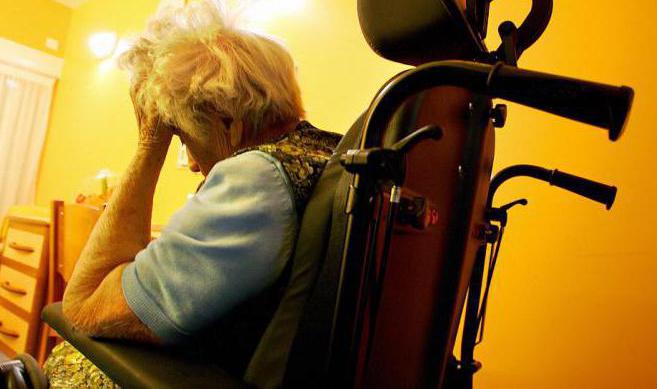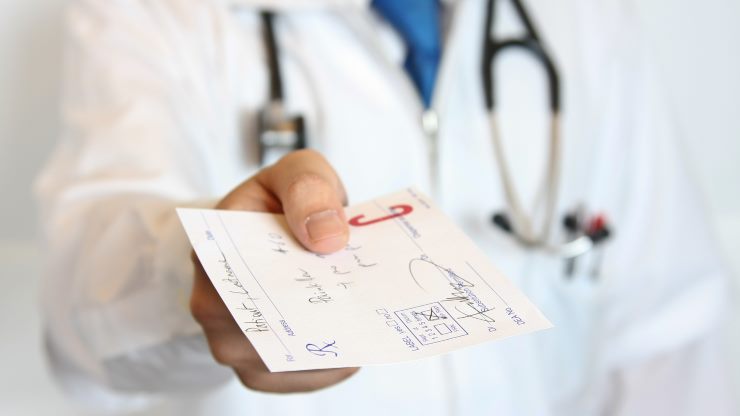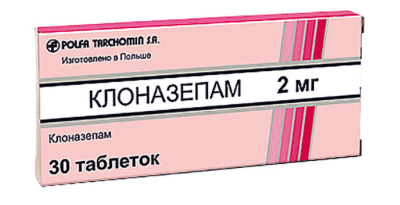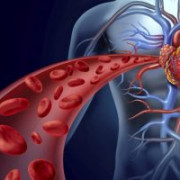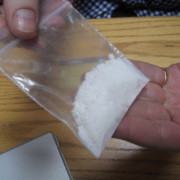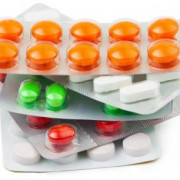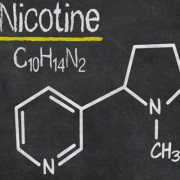Hydrocodone and acetaminophen (oral)
Содержание:
- Overdose
- How should I take acetaminophen and hydrocodone?
- Acetaminophen-hydrocodone side effects
- How is Antitussive Hydrocodone and Homatropine Supplied
- Признаки употребления
- Меры предосторожности
- История появления вещества
- Механизм действия
- Are there any alternatives?
- Hydrocodone side effects
- Hydrocodone and Acetaminophen Capsules Description
- What is acetaminophen-hydrocodone?
- Общие
- Acetaminophen-hydrocodone may interact with other medications
- How to take acetaminophen-hydrocodone
- Hydrocodone and acetaminophen side effects
- Overdosage
- Предупреждение о аллергии
- Аналоги
- Особенности лекарства
- Передозирование
Overdose
It is possible to overdose on this medication if a person takes too much. Symptoms of an acetaminophen-hydrocodone overdose may include:
nausea and vomiting
sweating
fatigue
slowed or stopped breathing
slowed heart rate
- very low blood pressure
- coma
liver damage or failure
If a person thinks that they have taken too much of this drug, they should call their doctor or seek guidance from the American Association of Poison Control Centers at 1-800-222-1222 or through their online tool. If symptoms are severe, a person should call 911 or visit the nearest emergency room right away.
Some acetaminophen-hydrocodone medications may contain other drugs, such as aspirin, ibuprofen, and antihistamines. It is important to never take any of these substances separately if a doctor has already prescribed a combined medication, as this can cause an overdose.
How should I take acetaminophen and hydrocodone?
Take acetaminophen and hydrocodone exactly as it was prescribed for you. Follow all directions on your prescription label. Never take acetaminophen and hydrocodone in larger amounts, or for longer than prescribed. An overdose can damage your liver or cause death. Tell your doctor if you feel an increased urge to use more of this medicine.
Never share this medicine with another person, especially someone with a history of drug abuse or addiction. MISUSE CAN CAUSE ADDICTION, OVERDOSE, OR DEATH. Keep the medicine in a place where others cannot get to it. Selling or giving away acetaminophen and hydrocodone is against the law.
Measure liquid medicine carefully. Use the dosing syringe provided, or use a medicine dose-measuring device (not a kitchen spoon).
If you need surgery or medical tests, tell the doctor ahead of time that you are using this medicine.
You should not stop using this medicine suddenly. Follow your doctor’s instructions about tapering your dose.
Store acetaminophen and hydrocodone at room temperature away from moisture and heat. Keep track of your medicine. You should be aware if anyone is using it improperly or without a prescription.
Do not keep leftover opioid medication. Just one dose can cause death in someone using this medicine accidentally or improperly. Ask your pharmacist where to locate a drug take-back disposal program. If there is no take-back program, flush the unused medicine down the toilet.
Acetaminophen-hydrocodone side effects
Acetaminophen-hydrocodone oral tablet may make you feel sleepy, dizzy, or lightheaded. Avoid driving a car or using machinery until you know how your body reacts to this medication.
This drug can also cause other side effects.
More common side effects
The more common side effects that can occur with acetaminophen-hydrocodone include:
sleepiness or drowsiness
feeling dizzy or lightheaded
nausea
vomiting
constipation
Serious side effects
Call your doctor right away if you have serious side effects. Call 911 if your symptoms feel life-threatening or if you think you’re having a medical emergency. Serious side effects and their symptoms can include the following:
- Skin rash
- Swelling of your face, throat, and mouth
- Liver problems, including liver failure. Symptoms may include:
- yellowing of your skin and the whites of your eyes
- pain in the upper right part of your stomach area
- swelling of your stomach area
- itchiness
- confusion
- feeling tired
- lack of appetite
- Trouble breathing
- Drug dependence
Disclaimer: Our goal is to provide you with the most relevant and current information. However, because drugs affect each person differently, we cannot guarantee that this information includes all possible side effects. This information is not a substitute for medical advice. Always discuss possible side effects with a healthcare provider who knows your medical history.
How is Antitussive Hydrocodone and Homatropine Supplied
Hydrocodone Bitartrate and Homatropine Methylbromide Tablets are available as white, round, scored, biconvex tablet debossed with “N” on upper side of the score, “350” on the lower side of the score and plain on the other side containing 5 mg hydrocodone bitartrate and 1.5 mg homatropine methylbromide and is available in:
Bottles of 100 NDC 43386-350-01
Bottles of 500 NDC 43386-350-05
Storage and Handling
Store tablets at 20°-25°C (68°-77°F). Dispense in a tight, light-resistant container, as defined in the USP, with a child-resistant closure (as required).
Oral prescription where permitted by state law.
Manufactured by:
Novel Laboratories, Inc.
400 Campus drive
Somerset, NJ 08873
Distributed by:
GAVIS Pharmaceuticals, LLC
400 Campus drive
Somerset, NJ 08873
Признаки употребления
Кроме перемены настроения и нелогичности поступков и мыслей, у человека, употребляющего Викодин проявляются следующая симптоматика:
- начинается слезливость, глаза у наркомана «на мокром месте» постоянно;
- из носа течёт как при простудном насморке;
- падает аппетит, снижается вес;
- человек постоянно зевает;
- в органах ЖКТ возникают колики и появляется тошнота;
- начинается сильное потоотделение, сопровождающееся ознобом.
Наиболее явными признаки бывают во время отмены препарата.
Наркологическая помощь специалистов!Оставьте номер телефона и мы свяжемся с Вами!
- — выбрать –Время звонка – Сейчас8:00 – 10:0010:00 – 12:0012:00 – 14:0014:00 – 16:0016:00 – 18:0018:00 – 20:0020:00 – 22:0022:00 – 00:00
- Заявка
Меры предосторожности
Перед началом приема данного препарата сообщите вашему врачу об уже используемых медикаментах, пищевых добавках (например, витаминах, натуральным добавкам и др.), аллергических реакциях, существующих заболеваниях и текущем состоянии здоровья (например, беременность, предстоящая операция и др.). Побочные эффекты препарата могут сильнее проявляться при определенном состоянии вашего организма. Принимайте препарат согласно указаниям вашего врача или следуйте инструкции по применению, поставляемой вместе с препаратом. Дозировка препарата зависит от вашего состояния. Сообщите вашему доктору об отсутствии изменений или ухудшении вашего состояния. Важные моменты, которые необходимо обсудить с вашим лечащим врачом, указаны ниже.
- Беременные, планирующие забеременеть или грудного вскармливания
- Избегайте употребления алкоголя
- Не диск или действуют механизмы
Узнать больше: Меры предосторожности и правила использования
История появления вещества
Дата синтезирования входящего в состав Викодина парацетамола — 1877 год (Университет Джонса Хопкинса). Затем в 1920 году в Германии был получен дигидроксикодеинон или гидрокодон. В 2004 году весь мир узнал о Викодине из сериала Доктор Хаус, где главный персонаж спасается от ужасающих болей в ноге с помощью этого препарата.
Использование гидрокодона как наркотика нарастало постепенно в 20 веке и перешло в наше столетие. В аптеке часто спрашивают Туссионекс от кашля и используют его как наркотическое средство для получения лёгкого кайфа. Он продаётся в виде таблеток, капсул, сиропа и эффективно борется с приступами кашля. Но принимать его нужно в соответствии с назначением врача, не превышать дозировку и не продлевать самостоятельно продолжительность курса лечения.

Механизм действия
Фармакокинетику лекарства викодина можно разделить на отдельное воздействие компонентов:
- Гидрокодон — слабый агонист каппа- и дельта опиоидных рецепторов. Основное действие направлено на м-опиоидные рецепторы. При приеме таблеток вещество абсорбируется из ЖКТ и 50% связывается с плазмой крови. Эффект начинает проявляться через полчаса после применения. Половина таблетки обезболивает на 3-4 часа, а вся на 7-8 часов. В организме человека гидрокодон метаболизирует на норгидрокодон и гидроморфон.
- Ацетаминофен — ингибитор энзимы циклооксигеназы, который вырабатывает простагландины, отвечающие за болевые ощущения. Замедления деятельности фермента снижает боль. Граничная концентрация после приема достигается через 10-60 минут. Парацетамол распадается в организме в течение 3 часов. Метаболиты ацетаминофена нетоксичны, 85% таблетки принятой перорально выводится через почки. Передозировка ведет к накоплению высокореактивных соединений, приводящих к повреждению печени.
Are there any alternatives?
There are other drugs available to treat your condition. Some may be more suitable for you than others. Talk to your doctor about other drug options that may work for you.
Disclaimer: Medical News Today has made every effort to make certain that all information is factually correct, comprehensive, and up-to-date. However, this article should not be used as a substitute for the knowledge and expertise of a licensed healthcare professional. You should always consult your doctor or other healthcare professional before taking any medication. The drug information contained herein is subject to change and is not intended to cover all possible uses, directions, precautions, warnings, drug interactions, allergic reactions, or adverse effects. The absence of warnings or other information for a given drug does not indicate that the drug or drug combination is safe, effective, or appropriate for all patients or all specific uses.
Hydrocodone side effects
Along with its needed effects, a medicine may cause some unwanted effects. Although not all of these side effects may occur, if they do occur they may need medical attention.
Check with your doctor immediately if any of the following side effects occur:
Less common
- Bladder pain
- bloating or swelling of the face, arms, hands, lower legs, or feet
- bloody or cloudy urine
- body aches or pain
- chills
- cough
- depression
- difficult or labored breathing
- difficult, burning, or painful urination
- ear congestion
- fear or nervousness
- fever
- frequent urge to urinate
- headache
- loss of voice
- lower back or side pain
- nasal congestion
- rapid weight gain
- runny nose
- sneezing
- sore throat
- tightness in the chest
- tingling of the hands or feet
- unusual tiredness or weakness
- unusual weight gain or loss
Incidence not known
- Agitation
- darkening of the skin
- diarrhea
- difficulty swallowing
- fast heartbeat
- hives, itching, skin rash
- loss of appetite
- mental depression
- nausea
- overactive reflexes
- poor coordination
- puffiness or swelling of the eyelids or around the eyes, face, lips, or tongue
- restlessness
- shivering
- talking or acting with excitement you cannot control
- trembling or shaking
- twitching
- vomiting
Get emergency help immediately if any of the following symptoms of overdose occur:
Symptoms of overdose
- Blue lips and fingernails
- blurred vision
- change in consciousness
- chest pain or discomfort
- cold and clammy skin
- confusion
- constricted pupil (black part of the eye)
- coughing that sometimes produces a pink frothy sputum
- decreased awareness or responsiveness
- dizziness, faintness, or lightheadedness when getting up suddenly from a lying or sitting position
- increased sweating
- irregular, fast or slow, or shallow breathing
- lightheadedness, dizziness, or fainting
- pale skin
- sleepiness or unusual drowsiness
- slow or irregular heartbeat
- weak muscle tone
Some side effects may occur that usually do not need medical attention. These side effects may go away during treatment as your body adjusts to the medicine. Also, your health care professional may be able to tell you about ways to prevent or reduce some of these side effects. Check with your health care professional if any of the following side effects continue or are bothersome or if you have any questions about them:
More common
Difficulty having a bowel movement
Less common
- Back pain
- dry mouth
- heartburn
- muscle spasms
- stomach pain or discomfort
Other side effects not listed may also occur in some patients. If you notice any other effects, check with your healthcare professional.
Call your doctor for medical advice about side effects. You may report side effects to the FDA at 1-800-FDA-1088.
Hydrocodone and Acetaminophen Capsules Description
Hydrocodone bitartrate and acetaminophen are supplied in capsule form for oral administration.
Hydrocodone bitartrate is an opioid analgesic and antitussive and occurs as fine, white crystals or as a crystalline powder. It is affected by light. The chemical name is: 4,5α-epoxy-3-methoxy-17-methylmorphinan-6-one tartrate (1:1) hydrate (2:5). It has the following structural formula:
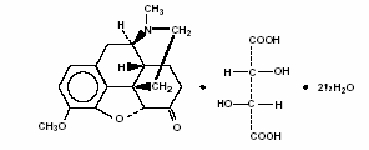
C18H21NO3•C4H6O6•2 1⁄2 H2O
M.W. = 494.490
Acetaminophen, 4´-hydroxyacetanilide, a slightly bitter, white, odorless, crystalline powder, is a non-opiate, non-salicylate analgesic and antipyretic. It has the following structural formula:
C8H9NO2
M.W. = 151.16
Each capsule contains:
Hydrocodone Bitartrate……5 mg
WARNING: May be habit-forming.
Acetaminophen…………..500 mg
In addition, each capsule contains the following inactive ingredients: colloidal silicon dioxide, croscarmellose sodium, magnesium stearate and microcrystalline cellulose with capsule shell composed of gelatin and titanium dioxide.
What is acetaminophen-hydrocodone?
Acetaminophen-hydrocodone is a prescription medication. As an opioid, it’s a . It comes as an oral tablet and an oral solution.
Acetaminophen-hydrocodone oral tablet is available as the brand-name drugs Norco and Vicodin. It’s also available in its generic form. Generic drugs usually cost less than brand-name drugs. In some cases, they may not be available in every strength or form as the brand-name version.
This medication is a combination of two or more drugs in a single form. It’s important to know about all the drugs in the combination because each drug may affect you in a different way.
Why it’s used
Acetaminophen-hydrocodone oral tablet is used to treat moderate to severe pain that other treatments have not been able to relieve.
How it works
This medication is a combination of hydrocodone and acetaminophen. Hydrocodone is an opioid (narcotic), and acetaminophen is an analgesic (pain reliever). Both drugs are used to reduce pain.
These drugs work in your brain to block pain signals. They decrease your ability to feel pain.
Общие
Возьмите с пищей, чтобы снизить риск расстройства желудка.
Храните это в контейнере с защитой от детей.
- Держите этот препарат подальше от света.
- Вкладыши
- Рецепт для этого лекарства не может повторно использоваться. Вам или вашей аптеке придется обратиться к своему врачу за новым рецептом, если вам нужно, чтобы этот препарат был заправлен.
Не беспокойтесь о рентгеновских аппаратах в аэропорту. Они не могут повредить ваши лекарства.
- Вам может потребоваться показать сотрудникам аэропорта этикетку аптеки для ваших лекарств. Всегда несите с собой оригинальную маркированную по рецепту коробку.
- Не помещайте это лекарство в перчаточный ящик вашего автомобиля или не оставляйте его в машине. Обязательно избегайте этого, когда погода очень высокая или очень холодная.
- Клинический мониторинг
- Ваш врач может потребовать проверки функции печени и почек, если у вас тяжелая болезнь печени или почек.
функция печени. Ваш врач может делать тесты печени, если у вас есть проблемы с печенью, чтобы убедиться, что это лекарство безопасно для вас и не вызовет проблем с дыханием.
- Предварительная авторизация
- Большинство страховых компаний не требуют предварительного разрешения на этот препарат.
РекламаРекламаРеклама
Альтернативы
Существуют другие лекарства, доступные для лечения вашего состояния. Некоторые могут быть более подходящими для вас, чем другие. Поговорите со своим врачом о возможных альтернативах.
Acetaminophen-hydrocodone may interact with other medications
Acetaminophen-hydrocodone oral tablet can interact with other medications, vitamins, or herbs you may be taking. An interaction is when a substance changes the way a drug works. This can be harmful or prevent the drug from working well.
To help avoid interactions, your doctor should manage all of your medications carefully. Be sure to tell your doctor about all medications, vitamins, or herbs you’re taking. To find out how this drug might interact with something else you’re taking, talk to your doctor or pharmacist.
Examples of drugs that can cause interactions with acetaminophen-hydrocodone are listed below.
Drugs that cause drowsiness
Taking certain drugs with acetaminophen-hydrocodone increases your risk of drowsiness, dizziness, tiredness, and reduced physical and mental function. If you need to use one of these drugs with acetaminophen-hydrocodone, the dosage of one or both drugs should be reduced.
Examples of these drugs include:
other opioids (narcotics)
antihistamines, which are used for allergies
antipsychotics, which are used for bipolar disorder, schizophrenia, or depression
benzodiazepines, which are used for anxiety
Drugs that increase serotonin
Taking this medication with drugs that increase the amount of a chemical called serotonin in your body can cause a serious problem. This problem, called serotonin syndrome, can be fatal. Tell your doctor if you are taking any of these medications:
some antidepressants (selective serotonin reuptake inhibitors , selective serotonin and norepinephrine reuptake inhibitors , tricyclic antidepressants , monoamine oxidase inhibitors , mirtazapine, trazodone)
certain drugs for migraine (triptans)
- certain drugs for nausea, such as ondansetron
- tramadol, which is used for pain
linezolid, which is an antibiotic
Drugs that inhibit activity of certain enzymes in the liver
Taking this medication with drugs that can inhibit activity of certain liver enzymes can increase the amount of hydrocodone in your body and cause more side effects. You may have increased breathing problems or drowsiness. Examples of these drugs include:
erythromycin
ketoconazole
protease inhibitors used to treat HIV, such as ritonavir
Drugs that increase activity of certain enzymes in the liver
Taking this medication with drugs that can increase activity of certain liver enzymes can lower the amount of hydrocodone or acetaminophen in your body. You may need a higher dose of this medication to control your pain. Examples of these drugs include:
rifampin
carbamazepine
phenytoin
Disclaimer: Our goal is to provide you with the most relevant and current information. However, because drugs interact differently in each person, we cannot guarantee that this information includes all possible interactions. This information is not a substitute for medical advice. Always speak with your healthcare provider about possible interactions with all prescription drugs, vitamins, herbs and supplements, and over-the-counter drugs that you are taking.
How to take acetaminophen-hydrocodone
All possible dosages and drug forms may not be included here. Your dosage, drug form, and how often you take the drug will depend on:
your age
the condition being treated
the severity of your condition
other medical conditions you have
how you react to the first dose
Forms and strengths
Generic: Acetaminophen-hydrocodone
Form: oral tablet
-
Strengths:
- hydrocodone 5 mg/acetaminophen 300 mg
- hydrocodone 7.5 mg/acetaminophen 300 mg
- hydrocodone 10 mg/acetaminophen 300 mg
- hydrocodone 2.5 mg/acetaminophen 325 mg
- hydrocodone 5 mg/acetaminophen 325 mg
- hydrocodone 7.5 mg/acetaminophen 325 mg
- hydrocodone 10 mg/acetaminophen 325 mg
Brand: Norco
Form: oral tablet
-
Strengths:
- 2.5 mg hydrocodone/325 mg acetaminophen
- 5 mg hydrocodone/325 mg acetaminophen
- 7.5 mg hydrocodone/325 mg acetaminophen
- 10 mg hydrocodone/325 mg acetaminophen
Brand: Vicodin
Form: oral tablet
Strength: 5 mg hydrocodone/300 mg acetaminophen
Brand: Vicodin ES
Form: oral tablet
Strength: 7.5 mg hydrocodone/300 mg acetaminophen
Brand: Vicodin HP
Form: oral tablet
Strength: 10 mg hydrocodone/300 mg acetaminophen
Dosage for moderate to severe pain
Adult dosage (ages 18 years and older and weighing at least 101 pounds )
5 mg or 2.5 mg hydrocodone / 300 mg or 325 mg acetaminophen: The typical dosage is 1–2 tablets taken every 4–6 hours as needed. The maximum dosage is 8 tablets per day.
7.5 mg or 10 mg hydrocodone / 300 mg or 325 mg acetaminophen: The typical dosage is 1 tablet taken 4–6 hours as needed. The maximum dosage is 6 tablets per day.
Child dosage (ages 0–17 years)
Dosage for people younger than 18 years hasn’t been established.
Disclaimer: Our goal is to provide you with the most relevant and current information. However, because drugs affect each person differently, we cannot guarantee that this list includes all possible dosages. This information is not a substitute for medical advice. Always speak with your doctor or pharmacist about dosages that are right for you.
Hydrocodone and acetaminophen side effects
Along with its needed effects, a medicine may cause some unwanted effects. Although not all of these side effects may occur, if they do occur they may need medical attention.
Check with your doctor immediately if any of the following side effects occur:
More common
- Dizziness
- lightheadedness
Incidence not known
- Back, leg, or stomach pains
- black, tarry stools
- bleeding gums
- blood in the urine or stools
- blood in vomit
- bluish lips or skin
- chills
- choking
- cough
- dark urine
- decrease in the frequency of urination
- decrease in urine volume
- difficult or troubled breathing
- difficulty in passing urine (dribbling)
- difficulty with swallowing
- fast heartbeat
- fever
- fever with or without chills
- general body swelling
- general feeling of tiredness or weakness
- headache
- hoarseness
- irregular, fast or slow, or shallow breathing
- light-colored stools
- loss of appetite
- lower back or side pain
- nausea
- nosebleeds
- not breathing
- painful or difficult urination
- pale or blue lips, fingernails, or skin
- pinpoint red spots on the skin
- puffiness or swelling of the eyelids or around the eyes, face, lips, or tongue
- severe or continuing stomach pain
- skin rash, hives, or itching
- sore throat
- sore tongue
- sores, ulcers, or white spots on the lips or in the mouth
- tightness in the chest
- unable to speak
- unusual bleeding or bruising
- unusual tiredness or weakness
- upper right abdominal or stomach pain
- vomiting
- yellow eyes and skin
Get emergency help immediately if any of the following symptoms of overdose occur:
Symptoms of overdose
- Bloody or cloudy urine
- change in consciousness
- chest pain or discomfort
- cold and clammy skin
- decreased awareness or responsiveness
- extreme drowsiness
- general feeling of discomfort or illness
- increased sweating
- irregular heartbeat
- lightheadedness, dizziness, or fainting
- loss of consciousness
- no blood pressure or pulse
- no muscle tone or movement
- not breathing
- severe sleepiness
- slow or irregular heartbeat
- stopping of heart
- sudden decrease in the amount of urine
- unpleasant breath odor
Some side effects may occur that usually do not need medical attention. These side effects may go away during treatment as your body adjusts to the medicine. Also, your health care professional may be able to tell you about ways to prevent or reduce some of these side effects. Check with your health care professional if any of the following side effects continue or are bothersome or if you have any questions about them:
More common
- Drowsiness
- relaxed and calm feeling
- sleepiness
Incidence not known
- Belching
- changes in mood
- difficulty having a bowel movement
- fear or nervousness
- feeling of indigestion
- hearing loss
- impaired hearing
- pain in the chest below the breastbone
- unusual drowsiness, dullness, tiredness, weakness, or feeling of sluggishness
Other side effects not listed may also occur in some patients. If you notice any other effects, check with your healthcare professional.
Call your doctor for medical advice about side effects. You may report side effects to the FDA at 1-800-FDA-1088.
Overdosage
Following an acute overdosage, toxicity may result from hydrocodone or acetaminophen.
Signs and Symptoms
Hydrocodone: Serious overdose with hydrocodone is characterized by respiratory depression (a decrease in respiratory rate and/or tidal volume, Cheyne-Stokes respiration, cyanosis), extreme somnolence progressing to stupor or coma, skeletal muscle flaccidity, cold and clammy skin, and sometimes bradycardia and hypotension. In severe overdosage, apnea, circulatory collapse, cardiac arrest and death may occur.
Acetaminophen: In acetaminophen overdosage: dose-dependent, potentially fatal hepatic necrosis is the most serious adverse effect. Renal tubular necrosis, hypoglycemic coma and coagulation defects may also occur. Early symptoms following a potentially hepatotoxic overdose may include: nausea, vomiting, diaphoresis and general malaise. Clinical and laboratory evidence of hepatic toxicity may not be apparent until 48 to 72 hours post-ingestion.
Treatment
A single or multiple drug overdose with hydrocodone and acetaminophen is a potentially lethal polydrug overdose, and consultation with a regional poison control center is recommended. Immediate treatment includes support of cardiorespiratory function and measures to reduce drug absorption. Oxygen, intravenous fluids, vasopressors, and other supportive measures should be employed as indicated. Assisted or controlled ventilation should also be considered.
For hydrocodone overdose, primary attention should be given to the reestablishment of adequate respiratory exchange through provision of a patent airway and the institution of assisted or controlled ventilation. The narcotic antagonist naloxone hydrochloride is a specific antidote against respiratory depression which may result from overdosage or unusual sensitivity to narcotics, including hydrocodone. Since the duration of action of hydrocodone may exceed that of the antagonist, the patient should be kept under continued surveillance, and repeated doses of the antagonist should be administered as needed to maintain adequate respiration. A narcotic antagonist should not be administered in the absence of clinically significant respiratory or cardiovascular depression.
Gastric decontamination with activated charcoal should be administered just prior to N-acetylcysteine (NAC) to decrease systemic absorption if acetaminophen ingestion is known or suspected to have occurred within a few hours of presentation. Serum acetaminophen levels should be obtained immediately if the patient presents 4 hours or more after ingestion to assess potential risk of hepatotoxicity; acetaminophen levels drawn less than 4 hours post-ingestion may be misleading. To obtain the best possible outcome, NAC should be administered as soon as possible where impending or evolving liver injury is suspected. Intravenous NAC may be administered when circumstances preclude oral administration.
Vigorous supportive therapy is required in severe intoxication. Procedures to limit the continuing absorption of the drug must be readily performed since the hepatic injury is dose dependent and occurs early in the course of intoxication.
Предупреждение о аллергии
Этот препарат может вызвать тяжелую аллергическую реакцию. Симптомы могут включать:
неприятное дыхание
припухлость горла или языка
- ульи
- сыпь
- зуд
- Если у вас возникнут эти симптомы, позвоните 911 или обратитесь в ближайшую комнату скорой помощи.
- Не принимайте этот препарат снова, если у вас когда-либо была аллергическая реакция на него.
Повторное повторение может быть фатальным (причиной смерти).
Предупреждение о взаимодействии с алкоголем Вы не должны употреблять алкоголь при приеме ацетаминофен-гидрокодона. (Форма устного раствора этого лекарства также содержит алкоголь). Питье алкоголя при приеме этого лекарства может вызвать:
замедленное или остановленное дыхание
сонливость
- усталость
- умственная облачность
- физическое и умственное замедление
- Предупреждения для людей с определенными состояниями здоровья
- Для людей с травмой головы:
Если у вас травма головы, гидрокодон может вызвать повышенное давление в вашем мозгу и вызвать проблемы с дыханием.
Для людей с проблемами желудка:
Соблюдайте осторожность при использовании этого препарата, если у вас кишечная непроходимость, язвенный колит или запор. Этот препарат может облегчить ваши симптомы этих проблем и затруднить врачу диагностику или найти причину проблем
Для людей с тяжелой болезнью почек:
Если у вас серьезные проблемы с почками, у вас могут возникнуть проблемы с дыханием, если вы принимаете этот препарат. Для людей с заболеваниями легких:
Если у вас заболевание легких, у вас может возникнуть проблема с дыханием, если вы принимаете этот препарат. Для людей с тяжелой болезнью печени:
Если у вас тяжелое заболевание печени, ваш риск печеночной недостаточности увеличивается. У вас также может быть повышенная вероятность развития проблем с дыханием. Для людей с увеличением простаты:
Если у вас увеличенная простата, прием ацетаминофен-гидрокодона может вызвать повышенные трудности при мочеиспускании. Для людей с астмой:
Если у вас тяжелая или неконтролируемая астма, не используйте этот препарат, не разговаривая с врачом. Возможно, вам придется принимать первые несколько доз в контролируемой обстановке. Для беременных женщин:
Этот препарат является наркозом категории C. Это означает две вещи: Исследования на животных показали неблагоприятные последствия для плода, когда мать принимает препарат.
Не было достаточно исследований, проведенных у людей, чтобы быть уверенными, как этот препарат может повлиять на плод. Расскажите своему врачу, если вы беременны или планируете забеременеть. Младенцы, рожденные от матерей, которые регулярно принимают опиоиды, такие как гидрокодон, могут рождаться физически зависимыми от этого препарата. Это может вызвать симптомы отмены или синдром отмены новорожденного опиоида. Симптомы могут включать:
- чрезмерный плач
- чихание
встряхивание
- быстрое дыхание
- повышенная дефекация
- зевая
- рвота
- лихорадка
- Также существует повышенная вероятность того, что у ребенка может возникнуть затрудненное дыхание, если это лекарство передается матери незадолго до родов.
- Для женщин, которые кормят грудью:
- Ацетаминофен передается в небольших количествах в грудном молоке, но его влияние на детей грудного вскармливания неизвестно. Неизвестно, переходит ли гидрокодон в грудное молоко.
Грудное вскармливание при приеме этого лекарства может сопряжено с рисками. Вы и ваш врач должны решить, будете ли вы принимать этот препарат или кормить грудью.
Для пожилых людей: У пожилых людей может быть снижение функции почек, печени и сердца. Если вы старше, ваш врач может начать вас с низкой дозы этого лекарства.
Для детей:
Всегда храните этот препарат в контейнерах с защищенными от детей крышками, которые надежно закрыты. Храните этот препарат в надежном месте, например, в закрытом аптечке, даже если вы не думаете, что ваш ребенок может достичь этого. ДозировкаКак принимать ацетаминофен-гидрокодон
Все возможные дозы и лекарственные формы не могут быть включены здесь. Ваша доза, лекарственная форма и то, как часто вы принимаете препарат, будут зависеть от: вашего возраста
Аналоги
Апизартрон. Это лекарственный препарат, который выпускается в форме мази и содержит в своём составе метилсалицилат, пчелиный яд и аллилизотиоцианат. За счёт данных компонентов проявляется, в первую очередь, местное анальгезирующее воздействие, в меньшей степени будет происходить вазодилатация, местное раздражение тканей для усиления кровотока. Показаниями к его применению могут служить болевые синдромы, связанные с невралгиями, радикулитами и другими недугами в поясничной области, а также последствия повреждений опорно-двигательной системы, в частности остеоартроз. Он оказывает меньший болеутоляющий эффект, в связи с чем имеет некоторые ограничения в назначении при выраженных патологических состояниях. Приобрести его можно без предъявления рецепта от специалиста, за счёт чего обеспечивается его широкое распростанение.
Ибупром. Является польским препаратом, который изготовлен на основе ибупрофена и оказывает выраженное болеутоляющее действие. Он способен снижать температуру тела и воспалительный процесс. Принимать его следует внутрь. Широко применяется при болевом синдроме, развивающемся на фоне люмбалгий, ишалгий, миалгий, бурситов и травматических воздействий. Проникая внутрь организма, он способен вызывать большое количество побочных эффектов, но привыкания не формируется в результате длительного приема Ибупрома. Препарат находится в свободной продаже, что облегчает его применение и повышает доступность.
Имет. Средство, проявляющее аналогичные свойства Викодину. Свой механизм действия осуществляет за счёт входящего в состав ибупрофена. Обладает выраженным жаропонижающим, анальгезирующим и противовоспалительным воздействием. Основной целью его назначения является снятие болевого синдрома. Имет получил широкую популярность в облегчении жизни пациентов, страдающих артритами, остеоартрозом, обострением подагрических состояний, бурситов и травматических воздействий. За счёт метаболизма в организме может проявлять большое количество побочных эффектов
Несмотря на отсутствие привыкания, его следует с осторожностью применять при воспалительных заболеваниях в желудочно-кишечном тракте.
Особенности лекарства
Достаточно опасным лекарством считается «Викодин». Что это такое, вы уже поняли. Медики называют препарат активным болеутоляющим средством, а также лекарством от кашля, которое принимают только внутрь. Терапевтическая дозировка этого медикамента в размере 5-10 мг эквивалентна 60 мг перорального морфина. По опасности привыкания данный препарат сравним разве что с «Кодеином». Продолжительный прием этого средства в больших дозировках может вызвать едва уловимую эйфорию, а в последующем – болезненное пристрастие.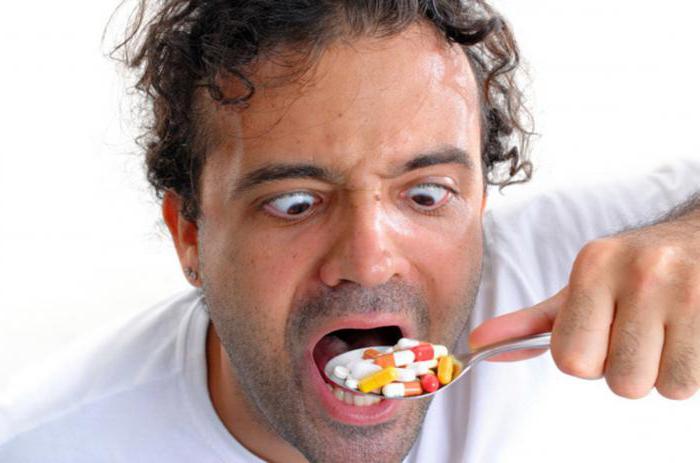
Препарат «Викодин», состав которого был представлен выше, является наркотическим средством. Он находится в списке II. Кстати, в некоторых аптеках данный препарат продают как наркотик из перечня III. Следует отметить, что производство и продажа этого болеутоляющего лекарства значительно возросли за последние несколько лет. Также увеличилось количество случаев его нелегального употребления.
Передозирование
Суточное потребление
Потребление гидрокодона не должно превысить 40 мг у пациентов с чувствительностью к опиатам. Типичный терапевтический диапазон 5—60 мг в сутки, в 4—6 доз по 2,5—10 мг. При назначении комбинированных средств с парацетамолом (в некоторых странах — ацетаминофен/APAP), не превышать 4000 мг парацетамола в сутки.
При хронических болях дозу пациентам увеличивают до 180 мг гидрокодона в день (только у опиато-зависимых, увеличивать плавно! смертельно для нового пациента).
Признаки передозировки включают затруднённое дыхание, чрезвычайную сонливость, оцепенение, холодную и/или липкую кожу, иногда брадикардию, гипотонию, кому.
Последствия
Серьёзная передозировка может повлечь остановку сердца, смерть.
Смешивание гидрокодона с алкоголем, наркотиками, амфетаминами, барбитуратами может привести к серьёзным неблагоприятным последствиям, включая остановку сердца, сердечный приступ, остановку дыхания, отказ печени и/или почек, желтуху, амнезию, слепоту и кому.
